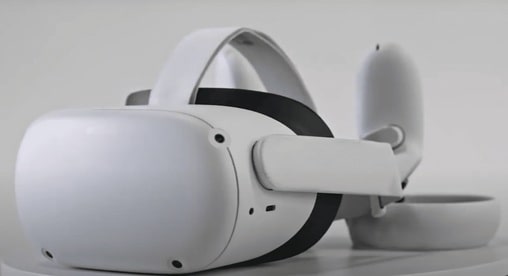Research has proven that using Virtual Reality (VR) headsets can cause behavioral changes, balance issues, cognitive problems, eye problems (soreness, vision changes), headaches, and MORE. This hasn’t discouraged tech companies from creating, manufacturing, promoting and selling VR headsets and software anyway (see 1, 2).
Nevertheless, complaints from VR users are increasing. In fact, last month, Facebook recalled millions of VR face liners due to users reporting rashes and hives. Strangely enough, even that hasn’t discouraged the company from promoting VR use – now in the workplace.
From Washington Post:
Facebook pushes VR for remote work but practicality, cost and nausea may stand in its way
The company unveiled virtual reality workplace app Horizon Workrooms, a remote collaboration tool for Oculus Quest 2 headsets
Facebook believes it has developed a tool for the future of work: a virtual reality app that allows remote workers the chance to collaborate in the same virtual space.
But it might take a long time for the social media company to convince massive numbers of workers to switch to VR for meetings, analysts say.
On Tuesday, the company unveiled what it calls “Horizon Workrooms” on the Oculus Quest 2 VR headset. The app, which is still being tweaked, allows workers to create an avatar, collaborate with others on a whiteboard, stream what’s on their laptop, take notes and interact with co-workers who video conference into the virtual room — all while sitting at their real-life workspace.
“We shouldn’t really have to physically be together to feel present, collaborate or brainstorm,” said Facebook CEO Mark Zuckerberg. “Video conferencing has taken us pretty far, but as we start planning to go back into the office, I’m not super excited about having most meetings be over video.”
The app also allows Quest users to use their hands instead of remote controllers, and spatial audio capabilities give users the sensation that people are in different areas of the room along with them just like in a physical conference room. Users can also choose from multiple room setups so that they face their counterparts or a whiteboard to listen to a presentation, for example.
“We just had this really big vision that people should be able to have that sense of presence far apart from each other,” said Andrew Bosworth, head of Facebook Reality Labs. “And not just around games and entertainment, but also potentially for more serious things.”
Facebook’s release comes as many workers continue to work remotely — some permanently — as the coronavirus pandemic forced many employees into work-from-home setups. Despite Facebook’s push further into VR, the technology is still nascent and the industry faces a slew of challenges that need to be overcome for it to become mainstream. Headsets for an entire workforce could be considered a major expense — the Oculus Quest 2 alone costs $299 — and the latest headsets are still somewhat heavy and bulky. The technology isn’t always as practical as a phone call or video conference, and some users could experience headaches and nausea while using the device.
